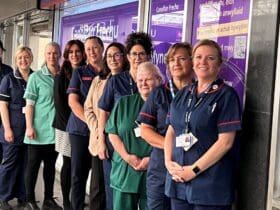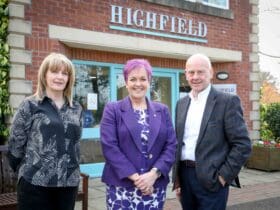Health Minister Eluned Morgan has today [24th January] announced £5m to increase the number of allied health professionals (AHPs) and increase access to community-based care to help people remain active and independent.
Available from April 2023, the funding will increase the number of community-based AHPs and support workers in the NHS. They will help people stay independent and well at home, helping to prevent hospital admissions and they will also help people to be quickly discharged from hospital with the right support and rehabilitation in place to recover at home.
Allied health professions is a group of 13 professions, which include physiotherapists, speech and language therapists, occupational therapists, dietitians and psychologists. Based in local community health teams, they provide preventative and early intervention services, alternatives to hospital admission and reduce the need for long-term social care.
Supporting people to recover at home with rehabilitation or spend less time in a hospital bed can have a considerable benefit on a people’s wellbeing, improve health outcomes and speed up recovery.
Examples of how AHPs can help people receive care and rehabilitation in the community include:
- The creation of virtual wards, which allow patients to receive the treatment they need at home safely and conveniently, rather than being in hospital, or expand the existing community resource teams which give GPs and paramedics alternatives to emergency departments.
- Treat people who have suffered a fall at home, if they do not need to go to hospital, and provide a programme of care and advice to reduce the likelihood of a further fall and rebuild their confidence and strength.
- Provide effective interventions to help people newly diagnosed with dementia to continue to live at home, support family carers and reduce the rate at which they may deteriorate.
Minister for Health and Social Services Eluned Morgan said:
“The focus of health and social care in Wales is on strengthening community-based services. We want people to live at home, as independently as possible and for as long as possible.
“We know that many people who are older and living with frailty or many health conditions can quickly deteriorate if they are inactive in bed for too long and, if they have been in hospital, when they leave they may be less mobile and less independent than when they were admitted. This funding will help us to help people return home as quickly as possible, with access to the right community assessment and rehabilitation, so they can remain active for as long as possible, living with their families and doing the things they enjoy most in their daily lives.
“Currently, not enough people can access the expertise of AHPs to maximise their health and improve their recovery. This is why I am announcing £5m to improve access to these skilled professionals and services to provide alternatives to hospital admission and reduce reliance on long-term social care. By expanding what health services can be provided within the community it will help us to tackle some of the current pressures facing our health and care system.”
Chief Allied Health Professions Adviser, Ruth Crowder said:
“Demand for AHPs’ skills has risen since the pandemic, and people are presenting to services with more complex needs. AHPs excel in delivering treatments which are particularly valuable in supporting the complex, multi-dimensional needs of people who are frail or living with long term health conditions.
“Without community AHP services, people may be admitted to hospital when they could have been treated at home, are unable to be discharged from hospital when their acute treatment is complete or end up moving to residential or nursing care earlier than might otherwise be the case, adding to other pressure on our social care services. Improving access to allied health professionals will bring a wider workforce together in a reformed primary care.”









Leave a Reply
View Comments